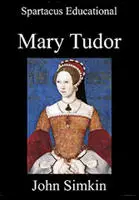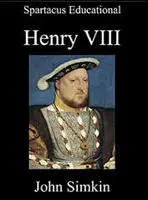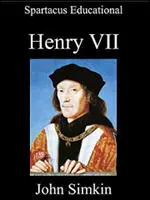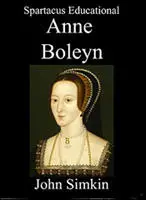Edmund Dudley
Edmund Dudley, the eldest son of John Dudley and Elizabeth Bramshott Dudley was born in about 1462. His father, a Sussex gentleman and justice of the peace, was the second son of John Sutton, first Baron Dudley, and brother of William Dudley, bishop of Durham. (1)
Dudley was educated at Oxford University. He then entered Gray's Inn one of the four ancient Inns of Court in London. This was the normal route for someone interested in a career in politics: "These were sometimes collectively referred to as the Third University of England, because in them young men were not only trained for the law but were also taught history... The legal education was particularly rigorous, consisting as it did in the study of case histories going back to Magna Carta, and excruciatingly complex disputations designed to test the vocational skills of students in preparing intricate writs and pleadings." (2)
According to his biographer, S. J. Gunn: "There (Gray's Inn) he took a prominent part in the inn's learning exercises. In the later 1480s he gave the first known reading in any inn on quo warranto, the procedure by which the king challenged the exercise of private jurisdictions. Thus he demonstrated the interest in the king's rights which was to be a hallmark of his career." (3)
Edmund Dudley - Government Minister
Edmund Dudley was elected to Parliament in 1491. In November 1496 he was chosen one of the two under-sheriffs of London, and in 1501 he served on a commission to investigate infringements of the king's feudal rights and prerogatives in Sussex. In January 1504, Henry VII appointed Dudley to serve as speaker of the House of Commons. By July 1506 he was president of the king's council, the first layman to hold the position. Over the next few years Edmund Dudley and Richard Empson became the king's most dominant members. (4)
Jasper Ridley has pointed out that Dudley and Empson were the chief instruments of the king's financial policy: "They seem to have been almost universally hated throughout England. They were accused of acting illegally when they extorted large sums of money from wealthy landowners under the recognisance system, and of not only obtaining this money for the King, but of enriching themselves in the process." (5) Christopher Morris, the author of The Tudors (1955) has suggested that Dudley was the king's most "unpopular and unscrupulous minister". (6)
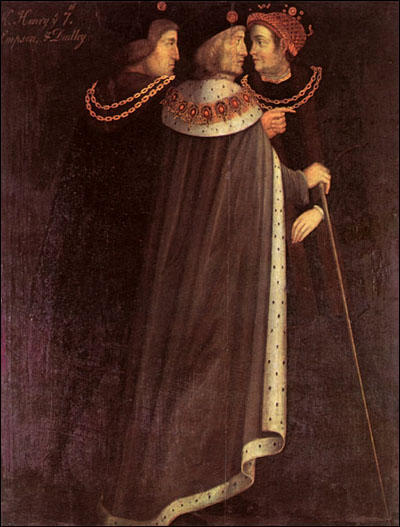
Dudley's main role was raising money for the king. "His accounts, surviving with various degrees of completeness in at least four early seventeenth-century transcripts, run from 9 September 1504 to May 1508. They suggest his role was to manage the king's use of a miscellaneous range of opportunities for financial exploitation of his greater subjects. He sold offices, wardships, and licences to marry the widows of tenants-in-chief; pardons for treason, sedition, murder, riot, retaining, and other offences. In less than four years he collected some £219,316 6s. 11d. in cash and bonds for future payment. He also enforced the king's rights and capitalized on his resources in a more specialized way as chief justice of the royal forests south of the Trent." (7)
Arrest & Execution
Dudley was accused of using his position to build up his own wealth. By 1509 he had built up a landed estate in sixteen counties, worth some £550 a year gross, plus £5,000 or more in goods. He was granted a dozen stewardships of crown estates. Most of his money came from bribes concerning legal matters. Dudley and Empson were "resented and distrusted by the bishops and the older nobility". (8) In recent years, historians have discovered a little more about the activities of Dudley and Empson. "Some of this new material seems to vindicate them to some extent, or at least to show that everything they did was justified by the law of England. Other documents confirm their high-handed methods." (9)
Henry VII died on 21st April 1509, but the fact was not announced until the evening of the 23rd. The following day Dudley and Empson were arrested and sent to the Tower of London. It was claimed that after the death of Henry that he conspired to stage a coup d'état. As Roger Lockyer has argued: "Empson and Dudley were tried on a trumped-up charge of treason... Lack of gratitude was to be one of the most typical of Henry's characteristics." (10) The main intention of Henry VIII was to suggest the "disavowal and reversal of the oppressive policies with which they were identified". (11) The new king also declared an amnesty towards certain fines imposed on the aristocracy. (12)
Edmund Dudley was beheaded at Tower Hill on 17th August 1510.
| Spartacus E-Books (Price £0.99 / $1.50) | ||||||
|---|---|---|---|---|---|---|
Primary Sources
(1) S. J. Gunn, Edmund Dudley : Oxford Dictionary of National Biography (2004-2014)
At Henry VII's death Dudley had many enemies and few friends even among his fellow councillors. Henry died late on 21 April 1509, but the fact was not announced until the evening of the 23rd. Early on the 24th Dudley and Empson were arrested and sent to the Tower of London, blamed for the oppressions of the late reign. Dudley was tried in London in July and convicted of treason on the 18th, the charge being that on 22 April he had conspired to ‘hold, guide and govern the King and his Council’ by summoning a force of men to London under the leadership of various named associates. He may well have summoned the men, a prudent and possibly widespread precaution at a time of political uncertainty, but it is highly unlikely he intended such a coup d'état. In the parliament of 1510, when several statutes blamed him for the injustices of the previous regime, a bill to attaint him and Empson passed the Commons but failed in the Lords. Unaware of its failure, Dudley made an unsuccessful attempt to escape from the Tower....
His fate was finally settled when Henry VIII's progress took him through the midlands in summer 1510. There the king heard a fresh wave of complaints about the injustices of his father's ministers, and resolved on their execution. Dudley was beheaded on Tower Hill on 17 August 1510 and buried at the London Blackfriars.
Dudley made a convenient scapegoat for Henry VII's exactions. Certainly he had exploited his position as the king's executive, but so to a less extreme degree had most of Henry's other councillors. There are many signs that the general shape of policy was the king's.
Student Activities
Anne Boleyn - Religious Reformer (Answer Commentary)
Did Anne Boleyn have six fingers on her right hand? A Study in Catholic Propaganda (Answer Commentary)
Why were women hostile to Henry VIII's marriage to Anne Boleyn? (Answer Commentary)
Elizabeth Barton and Henry VIII (Answer Commentary)
Execution of Margaret Cheyney (Answer Commentary)
Pilgrimage of Grace (Answer Commentary)
Robert Aske (Answer Commentary)
Dissolution of the Monasteries (Answer Commentary)
Joan Bocher - Anabaptist (Answer Commentary)
Anne Askew – Burnt at the Stake (Answer Commentary)
Poverty in Tudor England (Answer Commentary)
Why did Queen Elizabeth not get married? (Answer Commentary)
Henry VIII (Answer Commentary)
Francis Walsingham - Codes & Codebreaking (Answer Commentary)
Mary Tudor and Heretics (Answer Commentary)
Sir Thomas More: Saint or Sinner? (Answer Commentary)
Hans Holbein's Art and Religious Propaganda (Answer Commentary)
Hans Holbein and Henry VIII (Answer Commentary)
1517 May Day Riots: How do historians know what happened? (Answer Commentary)
References
(1) S. J. Gunn, Edmund Dudley : Oxford Dictionary of National Biography (2004-2014)
(2) Geoffrey Moorhouse, The Pilgrimage of Grace (2002) page 66
(3) S. J. Gunn, Edmund Dudley : Oxford Dictionary of National Biography (2004-2014)
(4) David Starkey, The Reign of Henry VIII (1985) page 40
(5) Jasper Ridley, Henry VIII (1984) page 36
(6) Christopher Morris, The Tudors (1955) page 56
(7) S. J. Gunn, Edmund Dudley : Oxford Dictionary of National Biography (2004-2014)
(8) Peter Ackroyd, Tudors (2012) page 4
(9) Jasper Ridley, Henry VIII (1984) page 36
(10) Roger Lockyer, Tudor and Stuart Britain (1985) page 17
(11) David Starkey, Six Wives: The Queens of Henry VIII (2003) page 108
(12) Antonia Fraser, The Six Wives of Henry VIII (1992) page 50

